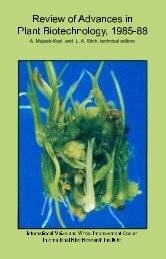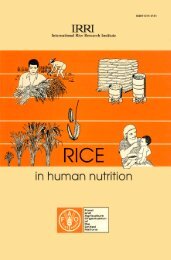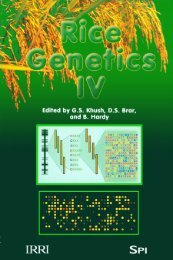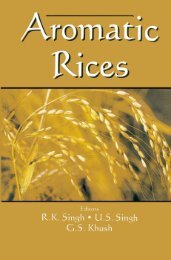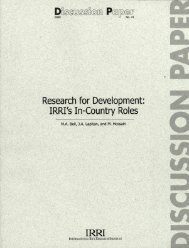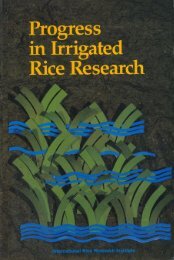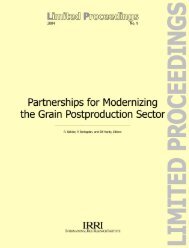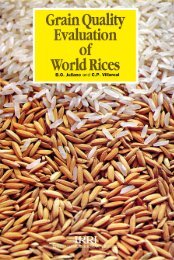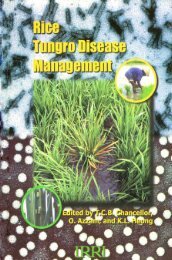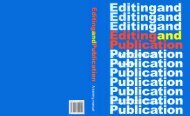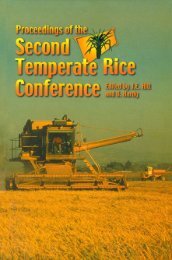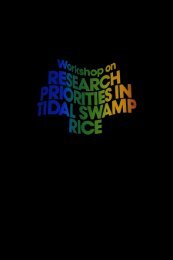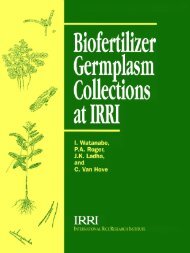An adventure in applied science - IRRI books - International Rice ...
An adventure in applied science - IRRI books - International Rice ...
An adventure in applied science - IRRI books - International Rice ...
- No tags were found...
Create successful ePaper yourself
Turn your PDF publications into a flip-book with our unique Google optimized e-Paper software.
Develop<strong>in</strong>g and staff<strong>in</strong>g the program 55tions of Khush and Coffman, and of the earlier members of the department aswell, are reported <strong>in</strong> later chapters.AGRONOMY AND SOILSFrom work done elsewhere, especially <strong>in</strong> Asia, it was evident from the startthat <strong>IRRI</strong> would need to do research <strong>in</strong> agronomy and soils. Wortman and Idecided to comb<strong>in</strong>e all agronomic and soil <strong>science</strong> research <strong>in</strong> one departmentcomposed of three pr<strong>in</strong>cipal scientists — an agronomist, a soil chemist, and asoil microbiologist. The agronomist would work on soil fertility, on water andweed control, and on such problems as land preparation techniques, plantspac<strong>in</strong>g, and comparisons of direct-seeded and transplanted rice. The soilchemist would study the <strong>in</strong>fluence of flood<strong>in</strong>g on chemical properties of thesoil and the impact of and cure for such adverse soil conditions as iron toxicity,sal<strong>in</strong>ity, and z<strong>in</strong>c and phosphorus deficiency. The soil microbiologist would<strong>in</strong>vestigate the microorganisms <strong>in</strong> rice soils, the biological fixation of elementalnitrogen, and the degradation of pesticides and herbicides <strong>in</strong> flooded soils.The first candidate <strong>in</strong>terviewed for the position of soil chemist was C.T.Abichandani, the soil chemist at CRRI <strong>in</strong> Cuttack, India. Bradfield and I werewell impressed with his work when we were <strong>in</strong> India <strong>in</strong> 1955. I had visited withhim several times between 1955 and 1960. In December 1960, Abichandani was<strong>in</strong>vited to <strong>IRRI</strong> for an <strong>in</strong>terview, and it was decided to make him a tentativeoffer. At that early stage <strong>in</strong> the Institute’s development, all new appo<strong>in</strong>tmentsand the salary to be offered were referred for approval to Harrar as chairmanof the Board of Trustees. It developed that the salary offered to Abichandaniwas too low to attract him and he decided not to accept the position.At the meet<strong>in</strong>g of the Board of Trustees on 5-6 October 1960, the matter ofa salary scale for <strong>IRRI</strong> professional staff was discussed and a committeecomposed of S<strong>in</strong>co, Fortich, and Garcia was formed to make a study of thesalary levels be<strong>in</strong>g used by other <strong>in</strong>ternational organizations such as the Foodand Agriculture Organization (FAO) and the World Health Organization. Thisreport was not ready <strong>in</strong> December when Abichandani was <strong>in</strong>terviewed. It wascompleted by late January 1961 and I carried it to New York <strong>in</strong> February anddiscussed it with Harrar and Hill. In the course of the conversations, it wasagreed that <strong>IRRI</strong> senior scientists would be offered salaries no less than them<strong>in</strong>imum of the correspond<strong>in</strong>g grades <strong>in</strong> other organizations hir<strong>in</strong>g <strong>in</strong>ternationalstaff. From then on, <strong>IRRI</strong> had little trouble attract<strong>in</strong>g capable people.The next soil chemist to be <strong>in</strong>terviewed was Felix N. Ponnamperuma, of SriLanka. He had obta<strong>in</strong>ed his Ph D at Cornell University and was well knownto Bradfield. Wortman and I had become acqua<strong>in</strong>ted with him dur<strong>in</strong>g visits toSri Lanka. In 1961 he was soil scientist <strong>in</strong> the Department of Agriculture <strong>in</strong> hisown country. Ponnamperuma visited Los Baños for an <strong>in</strong>terview <strong>in</strong> May 1961.Because he had studied abroad on a government scholarship, he was requiredto spend a certa<strong>in</strong> number of years work<strong>in</strong>g for his government before heaccepted other employment. <strong>IRRI</strong> made him an offer and agreed that ifnecessary, it would reimburse the Sri Lankan Government for the rema<strong>in</strong><strong>in</strong>g




